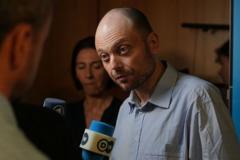Political prisoner Vladimir Kara-Murza is now free after spending over two years – 11 months of them in solitary confinement – in one of Russia’s “harshest prison regimes”.
He described his life in prison as “endless, meaningless and exactly the same”, akin to the movie Groundhog Day.
“Just a few weeks ago, I was absolutely certain I would die in Putin’s gulag,” he told the Washington Post on Wednesday.
Mr Kara-Murza, a Russian writer and activist, was one of 24 prisoners released on 1 August in the largest Russia-west prisoner exchange since the Cold War.
Mr Kara-Murza, who is also a British citizen, was arrested in 2022 for his strong opposition to the invasion of Ukraine.
He was held in a facility in Omsk, which he described as one of the harshest prisons in the country.
His day started at 0500 local time in a small cell about 2 by 3 meters (7 by 10 feet). Everything was scheduled – from his meals to his walks to when the lights would turn off. Most of his day was spent staring at a wall.
“You’re just sitting in your cell essentially doing nothing,” he said.
He was given a pen and paper and allowed to write for 90 minutes each day.
“To somebody whose profession is writing as it is in my case, I have to say that’s a particularly sadistic rule,” he said.
Mr Kara-Murza was kept in solitary confinement for 11 months. United Nations rules consider confinement to be torture if a person is held without human contact for more than 22 hours per day on at least 15 consecutive days.
He wasn’t allowed to contact his family by telephone and only spoke with his wife once in the two years he was jailed.
“It’s really not easy when you’re just completely deprived of any human contact,” he said.
To pass the time, Mr Kara-Murza said he read as much as he could and learned Spanish.
He recalled that prisoners would be regularly asked to state their tentative release date as well as their names and cell numbers. His – which he will never forget – was 21 April 2047.
“Frankly, it really gets to you,” he said of the repeated demand.
Mr Kara-Murza said three factors kept him from giving up while in prison: His Christian faith, his background as a historian and knowing “that he was right”.
“This knowledge is really important because I knew that I was right. I knew that the real criminals are those who are waging this aggressive and criminal war against Ukraine, not those of us who have publicly spoken out against it,” he said.
He described the two weeks since his release as “surreal”.
“What happened with us gives a lot of hope to so many others who are still languishing in Putin’s gulag,” he said.

